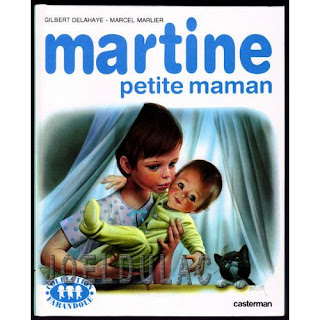OK. (Very-minimal-spoiler alert.)
Who else was struck by this beautiful passage?
Not only is this description of a baby extremely beautiful (not to mention the fact that we get to see a baby's daemon for the first time), it is also a very rare instance of a sincerely lovely, unironic description of babies I've ever seen in fiction for children.
I'm talking here of human babies, not animal babies. And note that I say 'for children' rather than 'for teenagers' - there are a number of teenage novels that do show babies with some degree of wonder, especially books about teenage pregnancies. But off the top of my head I can't think of many instances in younger fiction and MG (and I would argue Pullman is older end of MG) where a child protagonist marvels, especially for so long, at the sight of a little baby.
I myself have contributed to the huge literature for young children featuring horrible, disgusting, chaotic, hilarious babies:
Babies are an easy target for children's fiction. It's fairly likely that most young readers will have strong opinions about babies. Many have baby siblings. Many others are often in contact with their friends' baby siblings. Babies are cute, objectively - even, I'd venture to say, to children themselves - but they are also objectively abject in many ways; they monopolise adult attention; they are loud; they do stink sometimes - and any book that confirms that to children, using all the required forbidden vocabulary, is bound to be a winner.
And children, of course - especially young children - have little power over other people. Babies are the only human people who are objectively beneath them in strength, size, articulacy and decision-making power. They can be made fun of quite safely. Again, any book that pokes fun at that crowd will reinforce the sentiment that babies really are extremely inferior to children, and therefore might have a good chance of making children happy.
However, it wouldn't be fair to say that babies in MG or young children's fiction are mostly stupid or silly - often, they're much more ambivalent than that; they're semi-malevolent entities, much too clever for their own good, unpredictable and sassy.
 |
| The Rugrats |
But babies are always weird by default; in fiction for young readers, they are shrouded in mystery - the mystery, of course, of their origins.
 |
| from Babette Cole's Mummy Laid an Egg |
But neither Browne nor Cole take much time over the baby itself. Certainly not to look at it closely - certainly not to admire it, in the kind of delicate, patient, marveling way that Pullman does.
Some books that do that are, rather paradoxically perhaps, books for babies:
In what remains the landmark article on the matter, Perry Nodelman discusses wonderfully the prevalence of images of babies in books for babies, calling their aesthetic of purity and joy 'an ideological statement about what should, in fact, be understood as utopian—about what a baby’s world ought ideally to be and what a baby ought ideally to be'. In many ways Pullman's description of Lyra as a baby - and later on, of the care lavished upon her by the two young heroes, even as they rather improbably have to shield her for days from some seriously angry rain - is almost baby-book-worthy in its Romantic adoration of the baby: it is fully loving, fully enamoured of the perfection of that little body that she has (plus mini-Pantalaimon, who's not bad either).
Other iconic babies, therefore, come to mind of course:
 |
| click here for more unprepossessing ones |
Yet it is more in that tradition, clearly, that baby Lyra is to be sought - unsurprisingly, of course, when we know Pullman's background and literary and cultural inspirations. I would say that baby Lyra, and the exquisite softness and loveliness of her descriptions, also hark back to another genre, that of books meant to teach young girls to care for babies. As a child myself, I half-died of proto-broodiness every time I read Martine, petite maman (Martine, little mother), a pretty terrifying example of the category, from 1968:
Just look at that child looking at the baby: an extremely intense example of child-on-infant scopophilia (pleasure of looking), which I would say is really quite rare in most fiction for children today.
Yet of course children today, like all children, ever, do have those moments of absorbed contemplation when they encounter babies, those incomprehensibly small beings. The fascination for babies, for their tiny bodies and impenetrable minds, is not just an adult fantasy. Pullman's text is remarkable, I think, in its sincerity in dealing with that fact - its absolute refusal of ironic detachment when describing an infant through the eyes of a child. He is unafraid of the baby-Jesus connotations, or any of the others I've mentioned here. His choice to make baby Lyra so central and to have Malcolm so earnestly obsessed with her is remarkably uncool. It is also fascinating in itself, and I'd be curious to hear what you think of it.
--------------------------------
Clémentine Beauvais is a children's and young adult author in French and English, as well as a literary translator. Her latest YA novel, Piglettes, is out with Pushkin Press.











1 comment:
Fascinating piece. I haven’t read The Book of Dust yet, but this extract makes me want to. Pullman made the older Lyra an enchanting and charismatic character, so I guess it figures that he would make her similarly charming as a baby.
Post a Comment